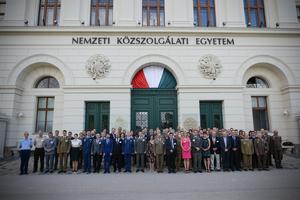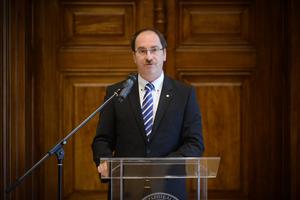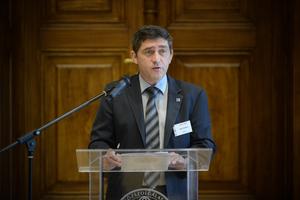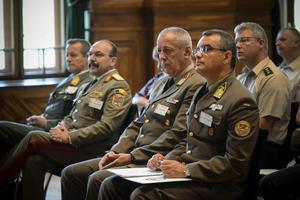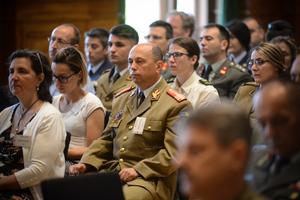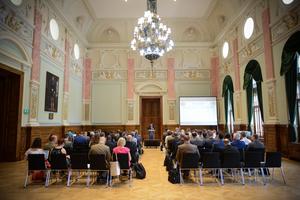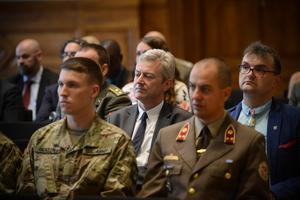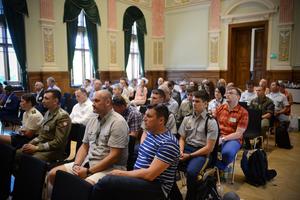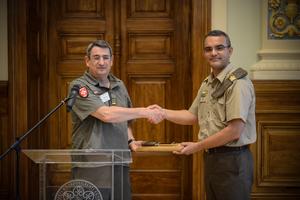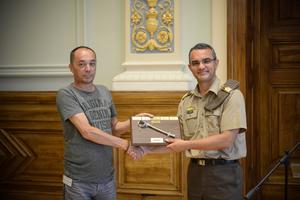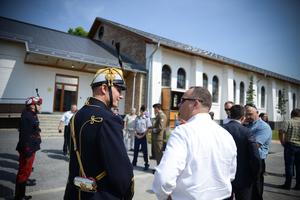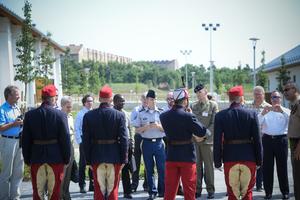The National University of Public Service hosted for the first time the international Military Academic Forum. The iMAF 2018 event took place at the Ludovika Campus of the National University of Public Service between 19-21 June 2018.
The forum was opened in the Széchenyi Assembly Hall of the Ludovika Main Building in front of Hungarian, European military higher education experts and representatives of NATO allies. During the opening, Prof. Dr. András Patyi, rector of NUPS welcomed the audience. He emphasized that it was a great honor for NUPS to host for the very first time this yearly organised, renowned professional event. He added that the organisers have chosen the perfect venue for the event because the Ludovika buildings represent the historical center of Hungary’s military higher education. Later in his welcome speech, the rector briefly presented to the audience the University’s faculties and structure. He added that the Faculty of Military Sciences and Officer Training aimed to prepare the students for future military challenges and iMAF plays a significant role in the development of the right methods to achieve these goals.
Dirk Dubois, Head of the European Security Defence College thanked NUPS and the organisers for coordinating such an important international event. The iMAF 2018 took place for the 6th consecutive years where the participants could discuss questions on military higher education and on the support of military higher education mobility programmes implemented throught the ERASMUS+ programme. “In the past, soldiers were often considered as biorobots who executed commands without questioning those. In the 21st century, this approach is not valid any longer, especially not in the officer training” - emphasized the Head of the European Security Defence College the importance of the continuous improvement of military higher education methods. Mr. Dubois also highlighted the primary challenges that the officer training should prepare the future military leaders for. Beside the traditional military threats, he particularly emphasized the new threats of hybrid warfare which want to divide society by the increase of populist movements and the spread of fake news. Mr. Dubois, apart from the relation of Russia with NATO and its role as a potential source of threat, talked about the situation of Turkey which, disillusionned from the European Union, defines itself more and more as a regional power. Turkey may also interfere with the internal affairs of other NATO allies because of the high number of Turkish citizens living abroad in other countries. According to the expert, to answer both internal and extrernal threats, the allies would be required to work together and the solution to the problems would be easier if the European integration would be more strengthened. The European Security Defence College works on achieving these goals and the College has recently extended the number of its professors by 50% in order to increase its efficiency. Furthermore, 3 new specialisations and one new cybersecurity programme were launched and since 2015, under the direction of Dirk Dubois, the institute even doubled its budgetary resources.
Following the speech of the Head of the European Security Defence College, colonel László Garas, Commander of NATO Force Integration Unit held a presentation on the present and future challenges from the North Atlantic Treaty Organization’s perspective. He agreed with Dirk Dubois and identified the hybrid warfare as the greatest security threat of our time. László Garas also agreed with the previous speaker on the importance of modern education that may be the only way to face these challenges and because of this reason, the iMAF event is a key element.
After analysing the NATO’s perspective, Dr. Harlad Gell, Head of Implementation Group of the European Initiative for the Exchange of Young Officers (EMIYO) gave a presentation. The programme was launched in 2008 by the defence ministers of the EU member states in order to support the military higher education mobility programmes within ERASMUS+. As part of this initiative, a curriculum for a international semester was developed in order to help promote mobility. At the moment, this opportunity was implemented only for given countries such as Poland, Romania, Greece. EMIYO is also the umbrella organisation of the iMAF conference, which was first held in 2013 with the aim of enhancing cadet mobility among the Member States, harmonising military higher education systems in different countries and thus creating a common European defense and security culture. Furthermore, joint educational modules were also elaborated which can be implemented, independently from the international semester, in the given country’s educational structure. Dr. Gell has chosen the motto “New Threats, New Common Modules” for the iMAF 2018 conference encouraging the professionals in the audience for a joint workshop during the event.
During the first day of the conference following the keynote speakers, different military higher education institutions presented their best practices. Lieutenant Colonel Marcin Bielewicz presented the work of The General Tadeusz Kosciuszko Military University of Land Forces university, Nikolaos Karadimas, International Semester Coordinator of the Hellenic Army Academy described their succesfull international semester programme and last but not least Erik Hedlund professor of the Swedish National Defence University talked about the available leadership training in their institute.
During the conference, the experts participated in different workshops where they could discuss their respective challenges in military higher education.
Next year the iMAF 2018 will return to Austria, to its home country where the Theresian Military Academy in Wiener Neustadt. will be the host institute.
